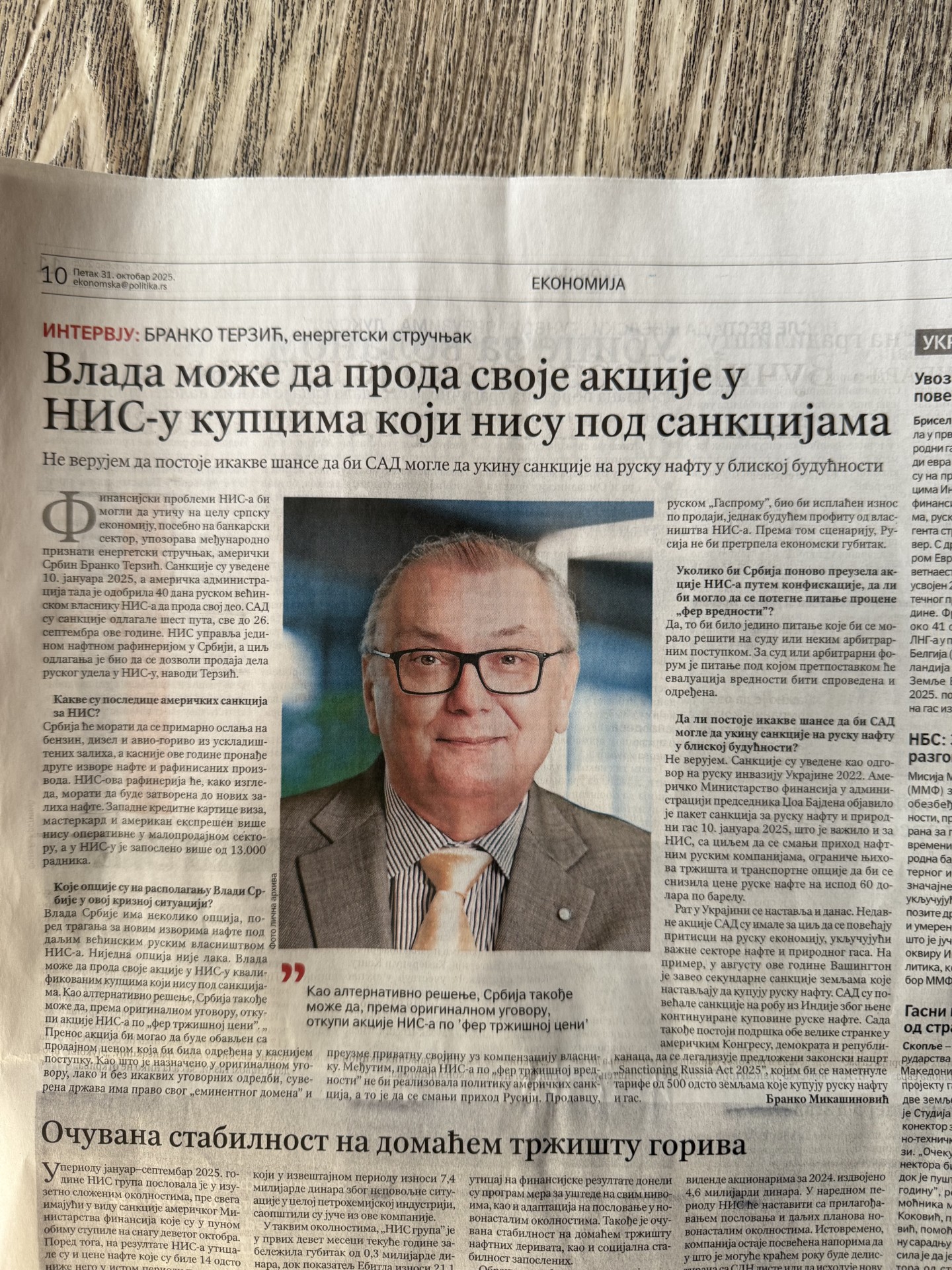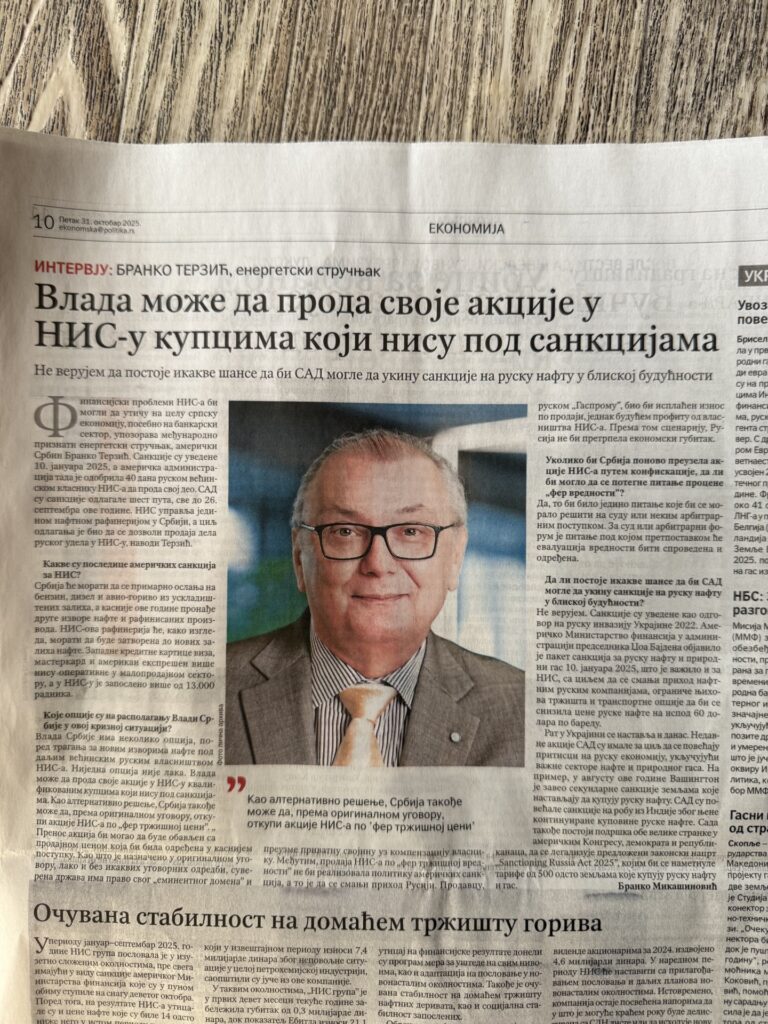NIS Sanctions
POLITIKA newspaper Belgrade Serbia
Branko Terzic Interviewed by Branko Mikasinovich
Friday October 31, 2025

Q. What is the basis for US sanction on NIS?
The Biden administration’s US Treasury announced a package of sanctions on Russia’s oil and natural gas sectors sector on January 10, 2025 just a week before the January 20 transfer of power to the newly elected Trump administration. The objective of the sanctions was to reduce revenue to Russia and Russian oil companies by limiting markets, reducing transportation options and to price Russian oil below market at $60 per barrel. As NIS is owned by Russian oil companies it comes under the Russian sanctions.
Q. When were sanctions on NIS first announced?
The sanctions went into effect January 10, 2025, but the US gave the Russian owner of NIS 45 days to sells its stake in NIS. The sanctions were postponed by the US six times to September 26, 2025. NIS operates the only oil refinery in Serbia. The purpose pf the postponement was to allow for the sale of Russian interest in NIS.
Q. What is the effect of the US sanction on NIS and Serbia?
NIS operates the only refinery in Serbia receiving oil from Croatia. AS Croatia must comply with the sanction it will no longer ship oil to NIS. Thus, Serbia will need to temporarily rely on gasoline, diesel fuel and aviation fuel in storage and later in the year find another source of oil or refined products. The NIS refiner shuts down without new oil supply. It has also been reported that Western credit cards VISA Master Card and American Express are no longer working at Sebia’s retail stations. NIS has over 13,000 employees in Serbia and over 300 NIS Petrol and Gazprom gas stations. Financial problems at NIS would affect the entire economy especially the banking sector.
Q. What options are available to the government of Serbia in this crisis?
The Serbian government has a number of options beyond looking for new oil supply under continuing Russian ownership of NIS. None of which are easy.
It can ask the Russian owners to sell their shares of NIS to qualified buyers not subject to sanctions. For example, the Croation oil pipeline company JANAF has expressed interest in acquiring NIS.
Serbia can, in the alternative, exercise its rights under the original sales contract to buy back the NIS stock at “fair market value.” The stock transfer could be done immediately with the sales price to be set later in legal proceedings as specified by the original contract.
Even without any contract provision a sovereign state can exercise its right “eminent domain” and take private property with compensation to the owner.
However, the sale of NIS at “fair market value” would not accomplish the objective of the US sanctions policy which is to reduce revenue to Russia. The seller, Russia’s Gazprom would be paid an amount upon the sale equal to the future profits from ownership of NIS. There would be no economic loss to Russia under that scenario.
Q. In the case of the Serbian state reacquiring shares of NIS by confiscation, is there an issue of estimating the “fair value.”?
Yes, that would be the only issue to be determined in some judicial or arbitration proceeding. The question for the courts or tribunal will be under what assumptions is the valuation to be made.
Q Is there any chance that the US may lift its sanction on Russian oil in the near future?
Not really. The sanctions were imposed as a response to Russia’s invasion of Ukraine in 2022. That war continues today. The most recent US policy developments have been to increase sanctions on the Russian economy including the vital oil and gas sectors. For example, In August 2025 the US imposed secondary sanctions on countries continuing to purchase oil from Russia. The US increased tariffs on goods from India due to its continuing purchases of Russian oil. There is also currently bi-partisan support in Congress for legislation titled “Sanctioning Russia Act of 2025” which would impose a 500% tariff on nations buying Russian oil and gas.
Read the Interview on the Politika website at:
The Honorable Branko Terzic is a former Commissioner on the U.S. Federal Energy Regulatory Commission and State of Wisconsin Public Service Commission; in addition he served as Chairman of the United Nations Economic Commission for Europe (UNECE) Ad Hoc Group of Experts on Cleaner Electricity. He holds a BS Engineering and honorary Doctor of Sciences in Engineering (h.c.) both from the University of Wisconsin- Milwaukee.
#BrankoTerzic #Serbia #Politcal #Ambassasdor #Senator #President #US #Interview #POLITKA

